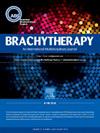化疗联合碘125粒子近距离放疗治疗中晚期癌性驱动基因阴性非小细胞肺癌的疗效和安全性。
IF 1.7
4区 医学
Q4 ONCOLOGY
引用次数: 0
摘要
目的:比较ct引导下碘125粒子近距离放疗联合化疗与单纯化疗治疗缺乏致癌驱动基因的中晚期非小细胞肺癌(NSCLC)的有效性和安全性。方法与材料:回顾性分析128例诊断为中晚期非小细胞肺癌的患者的临床资料,这些患者因缺乏致癌驱动基因突变而接受碘-125联合化疗或单独化疗。在6个月的随访中,比较两组患者的客观缓解率(ORR)、疾病控制率(DCR)、局部无进展生存期(LPFS)、总生存期(OS)、临床症状改善和不良事件。结果:平均植入碘125种子47粒(范围16 ~ 100粒)。中位D90为139.4 Gy。在III期NSCLC患者中,两组患者的6个月ORR分别为40.0%和8.0%,而IV期NSCLC患者的ORR分别为20.9%和4.0%。5-58个月随访期间未出现重大问题。III期和IV期NSCLC患者的OS无显著差异。III期患者的LPFS为14个月和9个月,而IV期患者的LPFS为8个月和7个月。症状改善率,包括咳嗽、胸部不适、咯血和胸缩,分别为87.2%对20.4%、77.8%对33.3%、77.8%对26.1%。结论:ct引导下碘125粒子植入化疗不能改善III期和IV期NSCLC的OS。然而,它确实延长了III期NSCLC的LPFS。此外,ORR远高于单纯化疗组,肺癌临床症状明显减轻,患者生活质量得到改善。本文章由计算机程序翻译,如有差异,请以英文原文为准。
Efficacy and safety of chemotherapy combined with iodine-125 seed brachytherapy for intermediate and advanced oncogenic driver gene-negative non-small cell lung cancer
PURPOSE
To compare the effectiveness and safety of CT-guided iodine-125 seed brachytherapy in conjunction with chemotherapy against chemotherapy alone for the management of intermediate and advanced non-small cell lung cancer (NSCLC) lacking oncogenic driving genes.
METHODS AND MATERIALS
Retrospective analysis was conducted on clinical data from 128 patients diagnosed with intermediate and advanced non-small cell lung cancer who received iodine-125 combined with chemotherapy or chemotherapy alone due to the absence of oncogenic driver gene mutations. The patients in two groups were compared at 6-month follow-up for objective remission rate (ORR), Disease control rate (DCR), local progression−free survival (LPFS), overall survival (OS), clinical symptom improvement, and adverse events.
RESULTS
A median of 47 (range, 16–100) iodine-125 seeds were implanted. The median D90 was 139.4 Gy. In patients with stage III NSCLC, the 6-month ORR were 40.0% and 8.0% in two groups, while those with stage IV NSCLC had rates of 20.9% and 4.0%. No significant issues arose during the 5–58 months follow-up period. OS did not significantly differ between stage III and IV NSCLC patients. The LPFS for stage III patients was 14 months and 9 months, compared to 8 months and 7 months for stage IV patients. Symptom improvement rates, including cough, chest discomfort, hemoptysis, and chest constriction, were 87.2% versus 20.4%, 77.8% versus 33.3%, and 77.8% versus 26.1%, respectively.
CONCLUSIONS
CT-guided iodine-125 seed implantation with chemotherapy failed to improve OS in stages III and IV NSCLC. However, it did extend the LPFS of stage III NSCLC. Furthermore, the ORR was much higher than that of the chemotherapy-only group, and lung cancer clinical symptoms were significantly reduced, improving patient quality of life.
求助全文
通过发布文献求助,成功后即可免费获取论文全文。
去求助
来源期刊

Brachytherapy
医学-核医学
CiteScore
3.40
自引率
21.10%
发文量
119
审稿时长
9.1 weeks
期刊介绍:
Brachytherapy is an international and multidisciplinary journal that publishes original peer-reviewed articles and selected reviews on the techniques and clinical applications of interstitial and intracavitary radiation in the management of cancers. Laboratory and experimental research relevant to clinical practice is also included. Related disciplines include medical physics, medical oncology, and radiation oncology and radiology. Brachytherapy publishes technical advances, original articles, reviews, and point/counterpoint on controversial issues. Original articles that address any aspect of brachytherapy are invited. Letters to the Editor-in-Chief are encouraged.
 求助内容:
求助内容: 应助结果提醒方式:
应助结果提醒方式:


